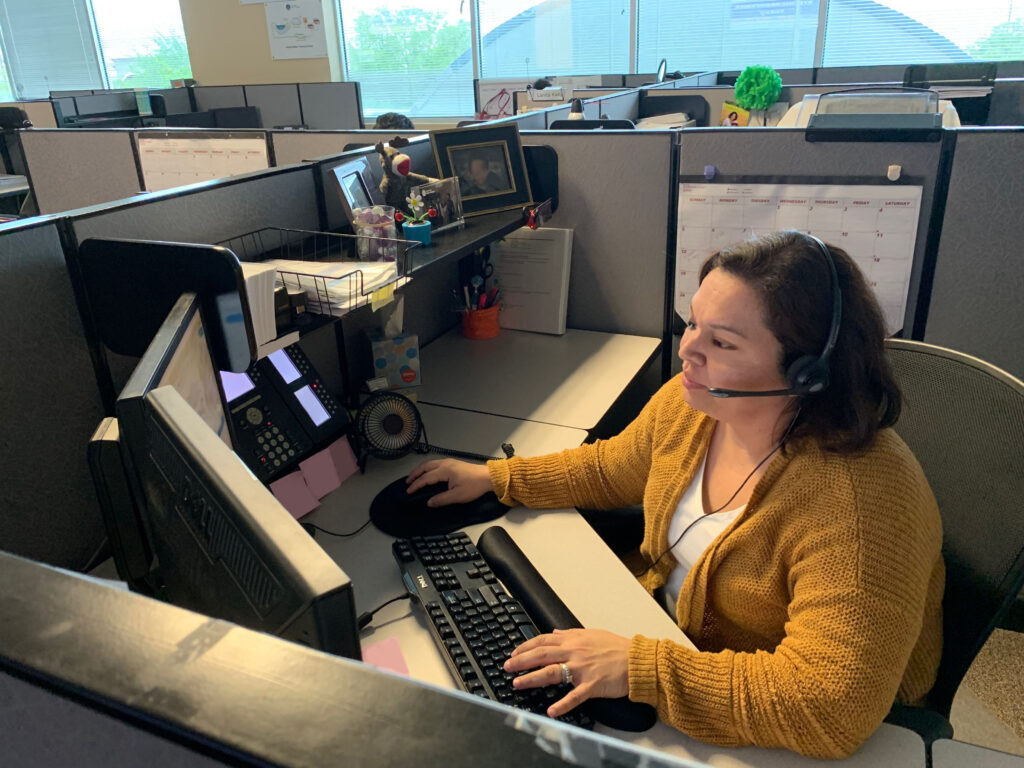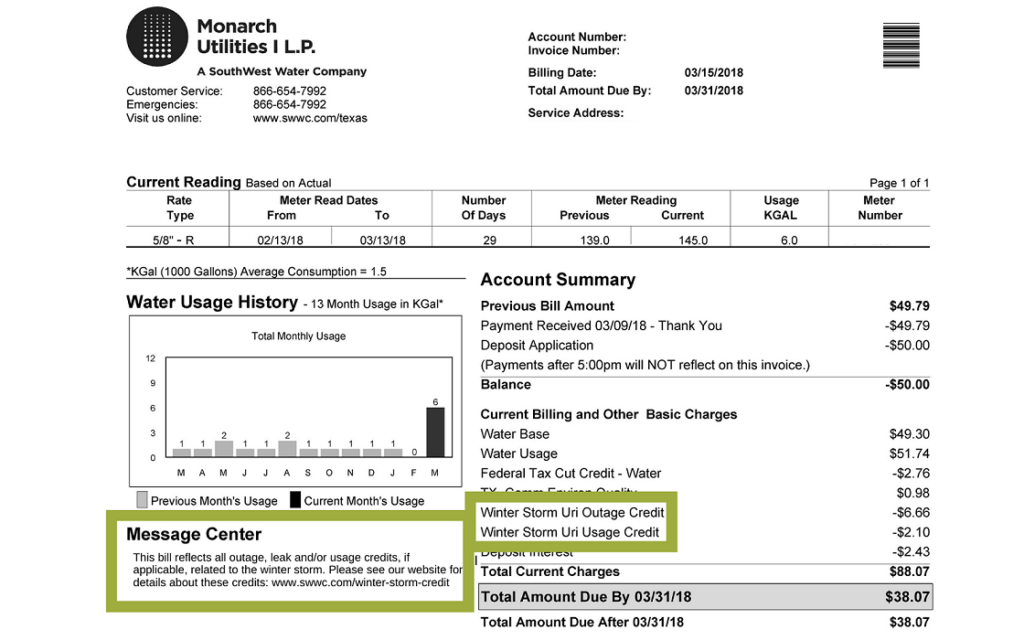
We know you may have a lot of questions regarding your bill given the recent storm and its impact. We’ve compiled the following information to assist your understanding.
Our current statement on your upcoming bills:
Texas endured the biggest statewide weather event in recent memory—and we know that many are still dealing with the fallout from the power outages and water shortages. As SouthWest Water Company and our subsidiary utilities here in our home state continue to assess and prepare for the future, we want our customers across Texas to know what they can expect as we seek to offer extraordinary relief for an extraordinary crisis. With no action or documentation needed from our customers, we are:
- Offering pro-rated daily credits for any system-wide service disruptions longer than 24 hours (rounding up to the whole day);
- Adjusting billed usage to make sure customers are not charged for leaks/drips by charging the lesser of January or February usage; and
- Setting winter average usage rates for wastewater customers that exclude February usage.
We will work with the Public Utility Commission of Texas, which regulates and sets our rates, and are subject to any rules or regulations they enact in response to the storm event. However, we believe this is an opportunity to do right by our customers and are taking these actions to help ease the financial burden.
We believe that a fundamental Texas value is to treat our neighbors like family. That is why we are going well beyond what is required to do on our part to help fellow Texans get back on their feet. We want to extend our appreciation to every customer, partner, community group and employee for their tireless work to come together to take care of one another. When an extraordinary event like this comes along, we cannot anticipate every scenario or third-party factor, but we know we can count on Texans.
Jeffrey L. McIntyre
President, Texas Utilities | SouthWest Water Company
How will I know if I received any credit?
Each bill that has been reviewed to see if it qualifies for credit will feature a note in the Message Center stating: This bill reflects all outage, leak and/or usage credits, if applicable, related to the winter storm. Please see our website for details about these credits: www.swwc.com/winter-storm-credit
If your bill calls for credit you will see one or both of the following indicators:
- A line item labeled “Winter Storm Uri Outage Credit.”
- A line item labeled “Winter Storm Uri Usage Credit.”
If you do not see either of these line items, then this means a base fee credit was not applicable and/or your February usage was lower than your January usage.

What was our process for calculating credit amounts?
For outage credit, our tariff, that was approved by the Public Utility Commission (PUC), requires that we credit a portion of the base fee for disruptions longer than 24 hours. We are following these guidelines.
For usage and leak credit, if your February usage was higher than your January usage, we will charge the January usage, since we assume the additional usage was a leak. If your February usage was lower than January, then we will simply charge the lower usage for February.
What if I have a leak?
If you have a leak, you do not need to send in proof of repair in order to receive credit. We will be evaluating your bill and will adjust credit appropriately.
If you haven’t already, we recommend getting your leak repaired before your next bill.
How will the storm affect my wastewater usage fee?
Each year, we determine your wastewater usage fee by averaging the water usage for bills during the months of December, January, and February. This sets your wastewater usage for a year and is then assessed again. Given the storm and the individual impact you may have experienced, we removed February 2021 water usage from being consider within the wastewater average. Therefore, your wastewater usage and fee for 2021 will be calculated from your December 2020 and January 2021 water usage only.
I received credit, but my bill seems higher than usual?
If you are a Monarch Utilities customer, we were scheduled to implement our temporary, interim rates with this bill. These are the rates we are implementing until we have our final rates approved by the Public Utility Commission. To read more about this, click here to learn about the rates.
Other Resources
Get to know your water system.
During the winter storm, you may have been confused by our updates and what it means when we say we have to “pressure-up” the water system. There’s a lot of equipment that the water must travel through to get to your home. Remember, it has to get from a local lake or underground aquifer, travels below miles of roadways, and then reach your tap.
Did you know your water quality report actually explains where we get your water from, the treatment process it undergoes, and what’s in your water? Read your neighborhood’s water quality report by clicking here.
We issued many boil water notices in the aftermath of the storm. Learn more about what it is below.
A Boil Water Notice is a precautionary notice that we issue when something happens within the water system that meets certain criteria set by the Texas Commission on Environmental Quality. This includes:
- low distribution pressures (below 20 pounds per square inch (psi),
- water outages,
- microbiological samples found to contain coliform bacteria,
- failure to maintain adequate disinfectant residuals,
- elevated finished drinking water turbidities for surface water systems, or
- other conditions indicating that the potability of the drinking water supply has been compromised.
During the winter storm, boil water notices were issued mainly because of water outages or low system pressure.
Also, in times where we issue a boil water notice, you may or may not have water, but someone else in the neighborhood could have water. The reason it still has to be issued is because the moment water is returned, you need to know that you must boil water before consumption while we await test results from the lab to check water quality.
For detailed information, watch the short video below.
